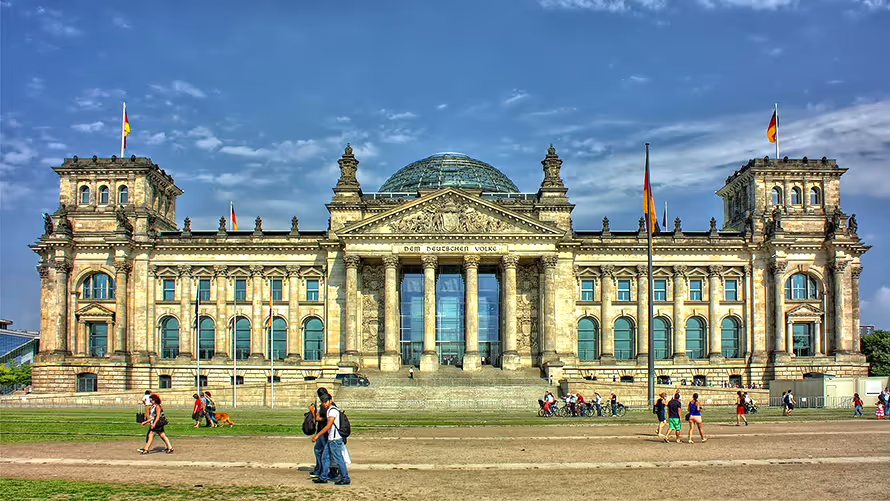
Study in Berlin, international student city guide
Berlin is a city that offers a dynamic mix of history, creativity, and modern innovation.
As Germany’s capital, Berlin attracts students from around the world with its affordable cost of living, vibrant cultural scene, and strong academic reputation. You’ll find everything from historic museums and galleries to cutting‑edge tech hubs and green spaces – all in a welcoming, international environment.
Berlin’s universities are well-regarded internationally and many offer programs taught in English or German. Whether your interests lie in engineering, social sciences, the arts, or business, Berlin provides great study options and strong global networks.
The city also hosts thriving industries in technology, culture, government, and healthcare, making it an excellent place for internships and practical experience.
Universities in Berlin
Berlin is home to one of the most diverse and dynamic university landscapes in Europe. From world-renowned research universities to highly specialised private colleges and applied sciences institutions, the city offers academic opportunities for every interest and background.
Whether you’re looking for research, creative arts training, professional business programs, or practice-based education, Berlin’s universities deliver high-quality teaching and strong international connections – often with affordable or even free tuition for EU students. Below is a full breakdown of the main types of universities in Berlin.
Public universities (Research & Excellence)
These are Germany’s most prestigious public universities – free or low-cost for EU students, highly ranked internationally for their research and academic programs.
- Freie Universität Berlin (FU Berlin)
- Humboldt‑Universität zu Berlin (HU Berlin)
- Technische Universität Berlin (TU Berlin)
- Charité – Universitätsmedizin Berlin (jointly with HU and FU)
- Universität der Künste Berlin (UdK)
Private universities
These institutions are smaller specialist universities, often focused on business, governance, counseling, or medicine, offering professional and English‑language programs.
- ESCP Europe Business School (Berlin campus)
- ESMT Berlin
- Hertie School
- International Psychoanalytic University Berlin (IPU)
- MSB Medical School Berlin
- Steinbeis University Berlin
- Touro College Berlin
- Sigmund Freud Private University Berlin
Specialist & Applied‑Sciences institutions
Berlin also hosts around 30 Fachhochschulen (universities of applied sciences), art academies, and technical colleges, such as:
- Alice Salomon Hochschule Berlin
- Berliner Hochschule für Technik (BHT)
- Hochschule für Technik und Wirtschaft Berlin (HTW)
- Berlin School of Economics and Law (HWR Berlin)
- Berlin University of Applied Sciences and Technology
- Weissensee Academy of Art Berlin
- Hochschule für Musik Hanns Eisler
- Ernst Busch Academy of Dramatic Arts
- Berlin International University of Applied Sciences
- Bard College Berlin
- CODE University of Applied Sciences
- Mediadesign Hochschule Berlin
- Catalyst Institute for Creative Arts & Technology
- German Film and TV Academy (DFFB)
- ESMOD Fashion School Berlin
- bbw Hochschule (University of Applied Sciences for Business and Engineering)
- BSP Business & Law School Berlin
- Evangelische Hochschule Berlin
- Hochschule für Soziale Arbeit und Pädagogik (HSAP)
- International University of Applied Sciences (IU)
- Akkon‑Hochschule für Humanwissenschaften
- FOM – University of Applied Sciences for Economics and Management (Berlin campus)
- German University for Health and Sport (DHGS)
- Media University of Applied Sciences Berlin
- BIMM Institute Berlin
- Macromedia University of Applied Sciences Berlin
- Quadriga University of Applied Sciences Berlin
- University of Europe for Applied Sciences (Berlin campus)
- OTTO-Fachhochschule Berlin (OTA)
- Steinbeis University Berlin (project-based professional degrees)
- Victoria – Internationale Hochschule
- Teikyo University (Berlin campus)
- Catholic University of Applied Social Sciences Berlin
- Psychologische Hochschule Berlin
- MetFilm School Berlin
Articles related to studying in Germany
Latest rankings for universities in Berlin
Berlin is home to several highly ranked universities.
To learn more about rankings and how to interpret them, see our University Rankings Explained article.
The table below summarizes their positions in the QS and Times Higher Education (THE) World University Rankings:
| University | QS World Ranking 2026 | THE World Ranking 2026 | Notable Strengths |
| Freie Universität Berlin (FU Berlin) | =88 | =113 | Humanities, social sciences, natural & life sciences; internationalisation; research excellence; Berlin University Alliance. |
| Humboldt University of Berlin (HU Berlin) | 130 | 89 | Humanities, natural sciences, arts; research tradition; Nobel affiliations; Berlin University Alliance. |
| Technische Universität Berlin (TU Berlin) | 145 | =160 | Engineering, natural sciences, computer science, entrepreneurship, innovation; Berlin University Alliance. |
Cost of living and tuition fees
Berlin is more affordable than other European capitals. Here’s a general estimate of the annual tuition costs for international students:
- Public universities: €250-€500 annual fees (EU students); €1,500-€3,000 (non-EU).
- Private institutions: €10,000-€25,000 depending on your program.
- Accommodation: €3,600-€7,200
- Food and groceries: €1,800-€2,400
- Transport: €400-€800 (using a monthly student pass)
- Other expenses: €1,500-€2,000
Berlin’s affordable lifestyle, including rent and food, makes it a cost-effective choice without compromising on quality.
Visa and immigration information
EU/EEA students do not need a visa to study in Germany. Non-EU students must apply for a national student visa and later obtain a residence permit (Aufenthaltstitel) after arrival.
You can find out more about visa requirements and how to apply on our Germany student visa guide.
Sign up to our regular email updates with advice on destinations, universities, scholarships and everything you need to prepare for studying overseas.
Sign up to our free emails nowStudent life in Berlin
Berlin is a vibrant, multicultural city with a student population of over 150,000. Its student life is dynamic and inclusive, with countless opportunities to get involved in social, cultural, and academic activities. Whether you’re into parties, politics, or peaceful parks, Berlin has something for everyone.
Universities and Erasmus networks regularly host events such as international evenings, themed parties, language exchanges, and guided city tours. Many students also join clubs focused on sports, art, tech, or social change. The city’s open atmosphere makes it easy to meet people from around the world and build an international network.
Berlin is also rich in cultural experiences. You can explore world-class museums on Museum Island, attend live music and film festivals, or enjoy open-air galleries and street art in districts like Kreuzberg and Friedrichshain. Green spaces like Tempelhofer Feld – an old airport turned into a public park – offer a place to relax, skate, have a picnic, or play sports.
Students benefit from discounted public transport, cheaper cinema and museum entry, and affordable living compared to many other European capitals. Whether it’s a night out in a techno club or a quiet afternoon in a historic café, student life in Berlin is diverse, accessible, and endlessly interesting.
Berlin is generally a safe city for international students, but for more information about staying safe, read our top safety tips for international students.
Top 5 tourist attractions for students:
- Brandenburg Gate – Iconic historic monument and city symbol
- Museum Island – UNESCO-listed complex of world-class museums
- East Side Gallery – Longest remaining stretch of the Berlin Wall
- Tempelhofer Feld – Giant park on a former airfield
- Reichstag Building – Home of German parliament with rooftop views

Getting around Berlin
Berlin’s public transport is reliable and simple:
- Extensive U-Bahn and S-Bahn networks connect all parts of the city.
- Buses and trams fill gaps in coverage.
- Cycling is popular and bike-friendly throughout the city.
- Walking in central areas is easy and pleasant.
- Students can get a semester ticket that covers public transport at a low cost.
Career opportunities
Berlin is one of Europe’s best cities for students and graduates starting their careers. The local economy is diverse and growing, offering great opportunities in areas like technology, creative industries, business, healthcare, and public policy. With its international atmosphere, affordable living costs, and strong startup scene, Berlin attracts young professionals from all over the world.
The city’s tech and startup sector has expanded quickly in recent years. Berlin is home to major tech hubs such as Silicon Allee and Berlin Tech Hub, where international startups and digital companies thrive. Fields like software development, user experience (UX), artificial intelligence (AI), fintech, and green tech are especially popular. Many companies offer internships and part-time roles for students, helping them gain valuable experience.
Berlin is also a creative capital, known for its art, music, film, and design scenes. The city offers many opportunities for students and graduates in areas like graphic design, music production, fashion, and photography. Its open and alternative culture, plus access to studios, events, and exhibitions, make it a top destination for creative work.
Healthcare and medical research are also key sectors in Berlin. Charité – Universitätsmedizin Berlin is one of Europe’s leading university hospitals. The city has many research institutes, biotech firms, and hospitals that offer internships and placements for students in medicine, pharmacy, public health, and related subjects.
As the capital of Germany, Berlin is also a centre for government and international affairs. It’s home to embassies, policy think tanks, NGOs, and international organisations. Students interested in politics, diplomacy, or global development will find many opportunities in the city.
Berlin’s universities provide strong career support, including internship placements, job fairs, and guidance for graduates. Many degree programs include practical experience or are linked directly to companies. For international students from outside the EU, Germany offers a clear pathway after graduation: you can apply for an 18-month Job Seeker Visa to find work related to your studies. Once employed, you may also qualify for a longer-term visa or EU Blue Card to stay and work in Germany.
The pros and cons of living and studying in Berlin
Pros
- Low or no tuition fees at public universities, especially for EU students.
- Diverse, international student community with many English programs.
- Rich cultural scene with museums, music, and festivals.
- Growing job market in tech, startups, and creative industries.
- Excellent public transport with affordable student discounts.
Cons
- Finding affordable student housing can be difficult.
- Skills in the German language are often needed for daily life and paperwork.
- Bureaucratic processes can be slow and confusing.
- Winters are cold and grey.
- Universities often lack a central campus, making student life less centralized.
